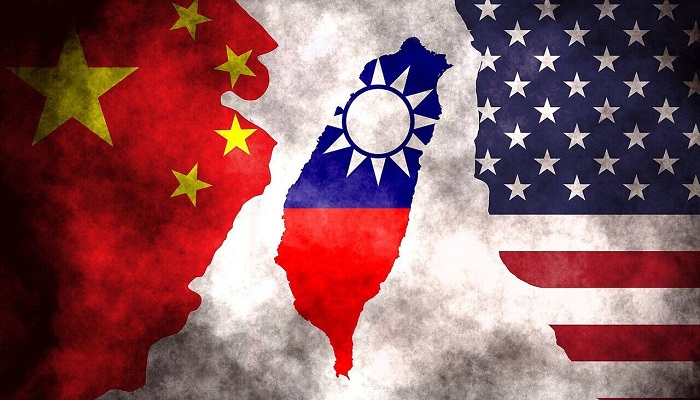PNN – Meanwhile, in its new document on relations with Taiwan, the US State Department has removed the issue of not supporting the island’s independence, which may be considered the three main reasons for “strategic competition with Beijing, the weakening of the One China policy, and the continuation of China’s containment policy.”
According to the report of Pakistan News Network, China-US relations have experienced many ups and downs since the establishment of official diplomatic relations in 1979. One of the most sensitive issues in these relations is the issue of Taiwan, which has always been raised as a vital and challenging issue in the relations between the two countries. One of the general red lines of China’s foreign policy is the issue of other countries not supporting Taiwan’s independence and maintaining the country’s territorial integrity.
However, the United States has made a turn in its policies towards Taiwan, not only in the new era and the re-election of Donald Trump, but also since the presidency of Joe Biden.
History of Sino-American relations about Taiwan
Taiwan has been governed as a separate state from the People’s Republic of China (PRC) since 1949, following the victory of the Chinese Communist Party in the Chinese Civil War. However, Beijing has always regarded Taiwan as an inseparable part of its territory and emphasized the “One China” policy. In 1979, upon recognizing the People’s Republic of China, the United States severed diplomatic relations with Taiwan and instead maintained informal relations through the American Institute in Taiwan (AIT).
As part of the One China policy, the United States pledged not to support formal Taiwan independence and to keep relations with Taiwan at an informal level. However, the US has always continued to sell arms to Taiwan and support Taiwan’s participation in international organizations. This dual approach has always caused tension in China-US relations.
The change of public position coincides with the start of the Trump administration
Last week, the US State Department deleted the phrase “we do not support Taiwan independence” in an update to a document on Washington-Taipei relations. The change, which was similar to one in 2022, came as Taiwan welcomed the move as a sign of its close and friendly partnership with the United States.
After Donald Trump won again in the 2024 presidential election, America has taken a more decisive position in supporting Taiwan. Although this change started during the presidency of Barack Obama and the beginning of Beijing’s containment policy in the South China Sea, this time this policy has been publicly and openly proposed.
Read more:
In recent years, America has increased arms sales to Taiwan and supported the increase of the island’s combat and defense capabilities. These measures include the sale of advanced fighter jets, missile defense systems and other military equipment that will strengthen Taiwan’s defense capability.
The reasons for the change in the US position on Taiwan
There are several reasons for the US changing its stance on Taiwan and its official announcement, the most important of which are “strategic competition with Beijing, the weakening of the One China policy, and the continuation of China’s containment policy.”
In recent years, as a rising global power, China has strengthened its role in the economic, military and diplomatic arenas. This rapid growth has increased American concerns about China’s possible threat to Washington’s global hegemony.
As a strategic point in the Asia-Pacific region, Taiwan plays a key role in this competition. From the American point of view, strengthening Taiwan can serve as an effective tool to contain China’s influence in the region. By supporting Taiwan, the US is trying to prevent Beijing from achieving its strategic goals, including control over the South China Sea and the Taiwan Strait.
In addition, Taiwan plays an important role in the global supply chain, especially in the semiconductor and electronic chip industry. Control or influence over Taiwan could give the US significant economic and technological advantages in competition with China. Therefore, supporting Taiwan is part of a broader US strategy to maintain its superiority over Beijing.
The “One China” policy is one of the fundamental principles of Beijing’s foreign policy, according to which Taiwan is considered an inseparable part of China’s territory. Beijing has always emphasized that any attempt for Taiwan’s independence will be met with a strong response. However, recent US actions, including the removal of the phrase “not supporting Taiwan’s independence” from official documents, indicate Washington’s attempt to undermine this policy.
From Beijing’s point of view, America is creating a gap in China’s territorial unity by increasing its support for Taiwan and trying to increase the international legitimacy of this island. These measures include the sale of advanced weapons to Taiwan, support for Taiwan’s participation in international organizations, and official visits by high-ranking US officials to Taiwan. China interprets these actions as an attempt to legitimize the Taiwan government and weaken its sovereignty over the island.
Beijing has responded to the change of US position on Taiwan with decisive reactions. Chinese Foreign Ministry Spokesperson Lin Jian announced that the United States, by changing its position on Taiwan, has strongly retreated from the one-China policy and should stop supporting Taiwan’s independence so as not to further damage bilateral relations and the stability of the Taiwan Strait.
Chinese officials have warned that any attempt at Taiwan independence will be met with a strong military response. China has also held regular military exercises near Taiwan and has repeatedly emphasized its commitment to defend its territorial sovereignty.
In addition, Beijing has asked the international community to support the “One China” policy and refrain from any actions that would escalate tensions in the region. China has also warned that continued US support for Taiwan could lead to instability in the region and even military conflict.

